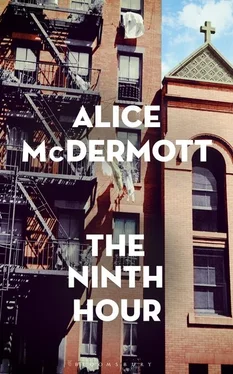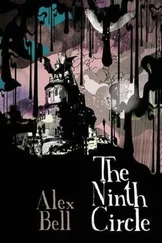She knew it was ridiculous just yesterday when she coaxed Sister Illuminata up the stairs for the three o’clock prayers. (“Wouldn’t you rather pray in the chapel, Sister?” she had asked. Butter wouldn’t melt in her mouth. “How long has it been since you’ve spent the afternoon hour away from your ironing board?”) And then filled the violet handkerchief with Sister’s alum—meant, Sally knew, for making flameproof the nuns’ veils, the donated infant clothes, the kitchen curtains. Telling herself all the while her plan was ridiculous. She would never do it. Never find the nerve.
And then waking so early this morning in her bed in the Tierney house. The mad sounds of the morning routine echoing through the walls. Feet pounding on the stairs and Mr. Tierney pounding on the bathroom door. The girls complaining they needed to get in there, too. A refrain of “Can I wear your … Can I borrow…” passed among the four of them. And Patrick calling to Michael, and Mrs. Tierney calling to the twins. Mr. Tierney singing wordlessly in his lovely baritone as he passed her doorway, going down the hall. The whistle of the kettle and the snap crack of bacon frying in the pan. Toast burning. And smelling again that moment when she believed, stupid and dumbfounded but, still, full of belief, that her father had returned in her absence, had returned to restore her mother’s happiness, her bright laughter, her life. To keep her from being entirely alone.
A ridiculous plan, she knew, even as she got up in the cold room and dressed and then, lying, told Mrs. Tierney she was going to see her mother at the convent. The lie itself, spoken out loud, making her ridiculous plan, her terrible plan, just that much more possible, the first step toward what she wanted to do. She told her lie and left the house, and suddenly her scheme was not merely a flight of her imagination but something possible. Something she might actually accomplish in the world: her mother’s life, her mortal life and her eternal life, restored.
“Going by the convent to see my mother,” she had said, lying so smoothly, leaving the house, and instead climbing the stairs to Mrs. Costello’s apartment. Letting herself in. The good handful of alum in her purse, wrapped in the fragrant handkerchief.
And now here she was, standing alone with it at the edge of Mrs. Costello’s bed.
She skimmed a mouthful of the tea and slowly moved it toward the woman’s lips. Mrs. Costello took it easily, swallowed, touched her lips together. But then shook her head. She coughed, put her whole body into the cough and said, “No more.”
“A few more,” Sally said. She felt a fever flush, that unnatural heat, rise up into her collar, over her face. Mrs. Costello took another, listless sip. Her lips were dry, mean, and thin. Pale hairs sprouted along the length of them. The bones in her face, her cheeks and her chin, had grown prominent. She was thin and pale, barely a wisp of a body. Barely there. Hardly a real presence in the room at all: no chest and narrow hips and only one good leg under the sheet and the counterpane. And yet the impediment to so many things.
Sally spooned up the mixture at the bottom of the cup.
Now Sister Jeanne came into the room again. She, too, had a teacup in her hand, and a spoon. “If you would take a bite to eat, Mrs. Costello,” she was saying as she approached the bed. “Maybe a bit of applesauce.”
Mrs. Costello, still coughing, delicately now, was repeating her small, piping “No.” Sinking again against her pillows. “Step aside, dear,” Sister Jeanne said to Sally. She placed herself between the two.
Sally turned to the dresser and caught her own reflection in the mirror. She looked pale and disheveled, wild-eyed, ridiculous. A kind of madness in the way she clutched the delicate cup and saucer to her chest. A kind of madness in the very notion of it: to stop a woman’s throat. Stop her breath. To brush aside her thin and useless life, burdensome as it was, in order to get what she was seeking for the mother she loved above all else.
She looked at the young faces in the wedding photo.
Mrs. Costello’s two good feet were in satin shoes just under the lace hem of her dress. Mr. Costello’s black hair was thick and wavy, glistening with pomade.
Weren’t they wild-eyed, too, looking out from the past?
Mrs. Costello was coughing again. Sally glanced over her shoulder, and then, in the time it took her to turn fully, the cough seemed to change register. The woman had sunk lower still in the bed, but now, suddenly, her spine arched as she coughed and her head fell back. She lifted her face from the pillow like a swimmer breaking water. Blotches of red appeared on her cheeks and her neck—they had the scattered and arbitrary shapes of shattered pottery. Mrs. Costello pressed her palms against the mattress, as if to rise, and then the coughing took hold of her completely, her shortened leg flailing with it. Sally moved toward her and felt the tea rise up over the rim of the cup, wetting her blouse. She spun around to put the teacup down, and when she turned once again, it was into Sister Jeanne’s dark back. Sister had stepped away from the bed, although her white bonnet was still aimed toward Mrs. Costello. She still held in her hands the cup of applesauce and the poised spoon. The woman’s coughing changed register once more, no longer a battling out of air—a sound like the beating of laundry—but of sucking air in, deep and wounded and gulping. Her small mouth was open, and now so were her pale eyes, full of more expression than Sally had ever seen: panic, fear, pain, astonishment.
Sally heard herself cry out. She took hold of the nun’s sleeve. “Help her, Sister. She’s choking.”
Without turning her head, Sister Jeanne moved her arm, held it across Sally’s waist, the spoon still in her hand, showing the girl that she should keep her distance. Sister Jeanne held her arm steady, her eyes on Mrs. Costello. She was steadfast and calm.
Sally apprehended only vaguely that Sister Jeanne knew it was better to wait, to stand back, to let the fit, the nonsense, pass.
Mrs. Costello’s face was deeply purple now. The sound coming from her was like a braying, a tearing. Sally could see the woman’s tongue in her wet mouth, between her blue lips. Her chest was heaving, seeming to turn the wisp of her body inside out. Mrs. Costello curled herself against the racket her lungs were making, against the struggle to breathe, bringing her good leg up to her middle, bowing her head down as if to meet it. And then her coughing changed register again, falling off, suddenly subsiding. Sally could once again hear the rain rattling down the gutters of the building.
And then Sister Lucy was in the room like night descending. She was still in her dark cloak, which seemed to be sailing, her black veil sailing, too. Both sparkled with drops of rain. Briefly, the room was infused with the smell of rain. Sister Lucy was on the bed, hovering over the bed, Mrs. Costello, light as a feather, in her arms, so easily and familiarly it seemed the woman moved of her own accord, gave herself over to Sister Lucy’s embrace. And now Sister Jeanne was at the edge of the bed as well, holding the woman’s shoulders as both nuns swiftly sat her up, slapped her wrists, and pounded her back. And then, gently, like a mother with a small child, Sister Lucy cradled Mrs. Costello’s head in the crook of her dark sleeve. Time passed. The woman seemed soothed. The two Sisters eased her down again. Sally saw Mrs. Costello’s long braid, neatly done, swing forward. She was limp, her mouth was gaping, and then Sister Lucy’s cloak covered her face as the nun brushed her forehead with her thumb, brushing away some perspiration or a tear. Sally saw Sister Jeanne bless herself. Sister Lucy did the same.
Читать дальше










